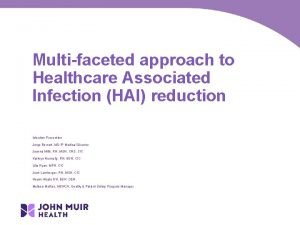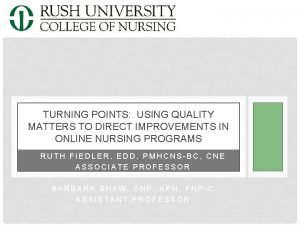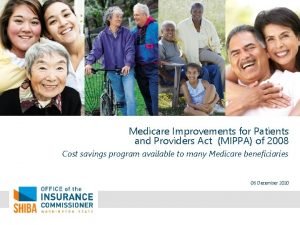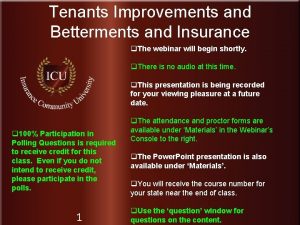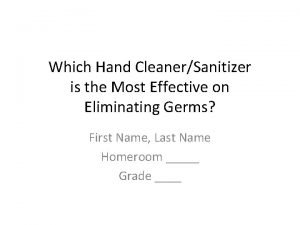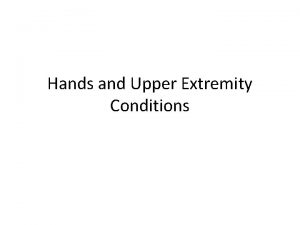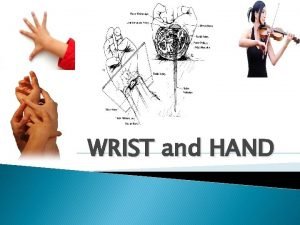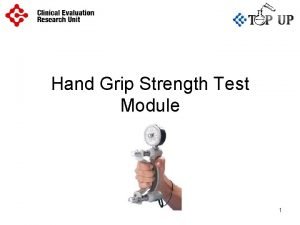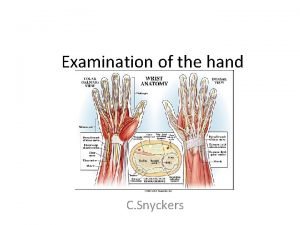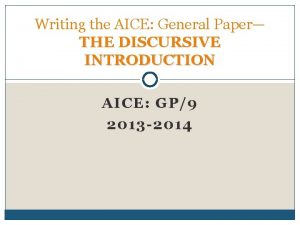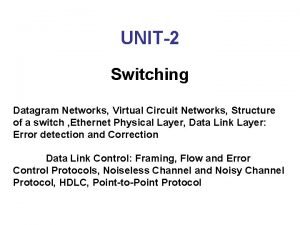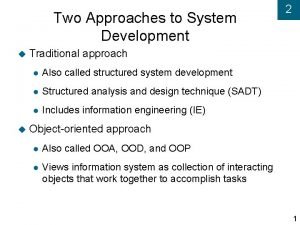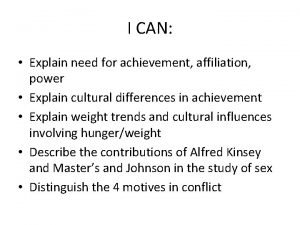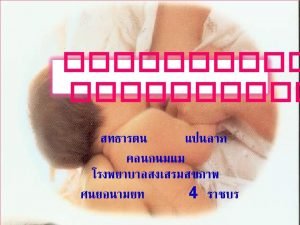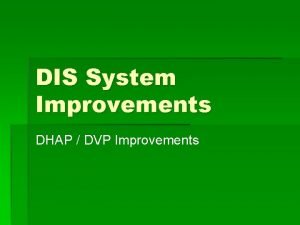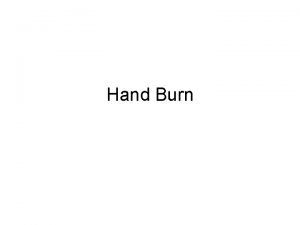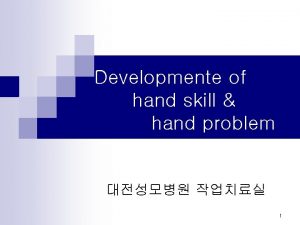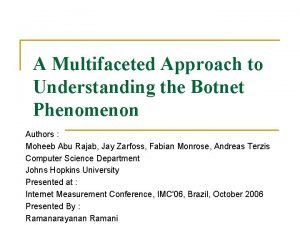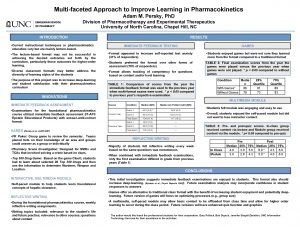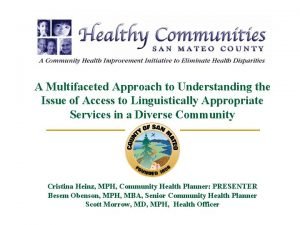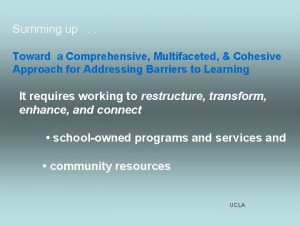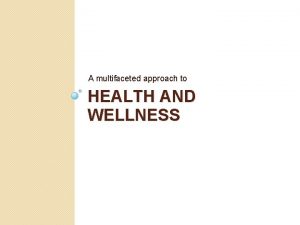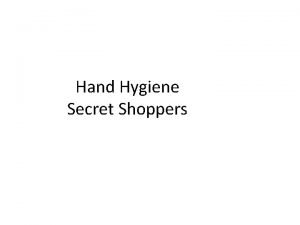A multifaceted approach to successful improvements in hand














































- Slides: 46

A multifaceted approach to successful improvements in hand hygiene: Beyond Posters and Reminders Clare Barry &Liz Mc. Creight Ontario Ministry of Health and Long-Term Care Strategic Planning and Implementation Branch April 10, 2008

Objectives • To provide background on how the Ontario Ministry of Health and Long-Term care developed and tested a multifaceted hand hygiene program for hospitals • To share lessons learned from the pilot phase • To discuss the impact of evaluation on design and roll-out of a multi-faceted hand hygiene program 2

Did you know? • Health care associated infections (HAI) are the most common serious complication of hospitalization: one in six patients admitted to Canadian hospitals acquire an infection as a consequence of their hospital stay. • In Canada, it has been estimated that 220, 000 incidents of HAI occur each year, resulting in more than 8, 000 deaths. • Health care associated infections were the 11 th leading cause of death two decades ago, but are now the fourth leading cause of death for Canadians (behind cancer, heart disease and stroke). • An increase in hand hygiene adherence of only 20 per cent results in a 40 per cent reduction in the rate of health care associated infections. (Ref. Mc. Geer, A (in press). (2008). Hand hygiene by habit. Ontario Medical Review, 75(3). • In USA it has been estimated 2, 000 incidents of HAI occur each year, resulting in more than 90, 000 deaths at a cost of $4. 5 billion

Pilot Approach • All Ontario hospitals were invited to apply to pilot the program. A selection committee chose ten hospitals representing a variety of sizes and geography and included; 3 Academic Teaching 4 Community (medium and large (100 -400 beds) 2 Northern Community (<100 beds) 1 Chronic and Rehabilitation • Three phases of evaluation conducted: baseline, interim (2 months after pilot launch), final (5 months after pilot launch) • Ministry provided funding to pilot hospitals to hire an on-site project coordinator to manage evaluation activities 4

Evaluation Strategy • Third party evaluation team conducted on-site and off-site evaluations • Evaluation tools included: – – – Health care worker surveys (awareness and knowledge) Patient Surveys (awareness) Focus Groups Key Informant interviews Compliance data through direct observation by Ministry trained observers assigned to pilot sites throughout evaluation (tool adapted from WHO) – Product volume measurements – MRSA/VRE data • Aggregate and individual site data fed back to pilot hospitals for action planning following baseline and interim data collection 5

Additional Evaluation • Facility coded site data and aggregate data provided to Ministry at baseline and interim. Final data analysis pending • Additional evaluation activities by Ministry staff: • • 2 visits to each site Weekly teleconference calls with on-site project coordinators Review of daily logs of project coordinators Review of minutes of local hand hygiene committees 6

Pilot Program Components Environmental modifications • alcohol-based hand rub at every patient point of care • good quality products to promote skin care Champions and role models • local faces on champion posters • visible and vocal advocacy Observation and feedback • trained observers • observation tool and training package Senior/middle management support • representation on local hand hygiene committee Implementation toolkit • standing item on senior • support on day-to-day implementation of the program management agendas • reminder and educational posters Education • introduction video • PIDAC hand hygiene fact • other supporting materials to sheet engage health care workers • online hand hygiene module • patient pamphlet and poster • educational materials 7

Just Clean Your Hands pilot involved: • Hand Hygiene Observational Audit § 4, 240 HCPs observed in 11, 351 opportunities across all three periods • Health care provider focus groups § 27 groups baseline, 20 groups interim • Health care provider survey § 2, 260 respondents, ~53% response rate across all three periods • Patient survey § 5, 594 respondents, ~57% response rate across all three periods § 66% of the surveys were from one site, but the results were similar across sites for most items. 8

Steady increase in hand hygiene compliance *Allied HCPs include continuing care/social workers, IV team, physiotherapists, dieticians, respiratory therapists. Note: There were few observations for environmental services, medical students, nursing students, patient transporters, and other HCPs, so the findings for these groups may not be reliable. Some data have been suppressed due to small numbers. 9

Movement to alcohol-based hand rub 10 Type of Hand Hygiene Behaviour (Obs. Audit) Numbers may not add to 100% due to rounding 10

Hand hygiene compliance by type of HCP (Observational Audit) HCP Category Final N Final Compliance Change from Baseline Allied HCPs* 195 41% -1% Environmental Services 152 29% +22% Medical Students 20 15% -8% 3, 205 60% +16% Nursing Students 23 48% +6% Patient Transporters 50 22% +14% Physicians 339 28% +10% Others 28 29% +8% Nurses, PSWs, PCAs *Allied HCPs include continuing care/social workers, IV team, physiotherapists, dietitians, respiratory therapists Note: The compliance rate for each type of HCP may be affected by the mix of opportunities observed, since different types of opportunities have different compliance rates. Note: There were few observations of medical students, nursing students, and other HCPs, so the findings for these groups may not be reliable. 11

Patient confidence increased 12 From Patient Survey: • • 91% of patients indicated they feel more confident about the health care system knowing there is a hand hygiene program in place (final assessment period) Interim results were similar Numbers may not add to 100% due to rounding 12

Summary (Reference: A Quick Guide to Just Clean Your Hands) § Good data can close the gap between perception and practice § Alcohol-based hand rub is convenient, faster and healthier for health care providers’ hands § Putting hand rub containers at point of care improves hand hygiene compliance § Hand hygiene involved everyone in the hospital § Leadership and communication are key.

Summary (Reference: A Quick Guide to Just Clean Your Hands) § Patients are partners in hand hygiene but do not want to be responsible for reminding health care providers to clean their hands. § Patients are more confident about their care when a hospital has a hand hygiene program. § Knowing your rates helps motivate staff and sustain the program. § Success is a steady improvement in compliance rates. § Education helps health care workers know when to clean their hands

Why don’t health care providers “just do it”? • Many health care providers do not have a clear understanding of the essential times to clean their hands • Providers’ perceive that they are already practicing good hand hygiene • Physical barriers, such as the lack of access to hand hygiene products like alcohol-based hand rub at point of care • Hand hygiene products that are unpleasant to use or hard on their hands and the lack of a hand care program to promote healthy intact hands. 15

Why is hand hygiene compliance low? Behavioural studies indicate there are two types of hand hygiene practice: 1. The health care provider’s internalized need of when hand hygiene is necessary (inherent hand hygiene practice): – health care providers generally clean hands when their hands are visibly soiled, sticky or gritty, or for personal hygiene purposes (e. g. after using the toilet). Usually these indications require handwashing with soap and water. 2. Other hand hygiene indications (non-inherent hand hygiene practice are not triggered by an intrinsic need to cleanse the hands. – Examples of non-inherent practice include touching a client, taking a pulse or blood pressure, or touching the environment. This type of hand hygiene is frequently missed in health care settings.

Just Clean Your Hands - Six Program Components 17

Point of Care – the right way, in the right place • Busy health care providers need access to hand hygiene products where patient/patient environment contact is taking place • This enables health care providers to quickly and easily fulfill the essential moments for hand hygiene. • Providing alcohol-based hand rub at the point of care (e. g. within arms reach) is an important system support to improve hand hygiene Point of care refers to the place where three elements occur together: • the patient • the health care provider • care involving contact is taking place 18

Point of Care – Not an easy task! • Solution is different for every facility and within each unit • Requires careful workflow analysis, multiple locations, and involvement of local multidisciplinary team to assess placement.




Placement Tool

Taking care of health care provider hands

Creative Approach • Reviewed the communications from other jurisdictions—UK, Switzerland, US • Researched the attitudes of Ontario health care providers and developed an approach that was designed to • engage • entertain • encourage action • The Big Idea = presenting the absurd vs. a simple solution • No finger pointing • Uses humour that respects both the patient and HCP • Very different from existing messaging • Communications evaluated and intrinsically linked with program outcomes. Social marketing approach 25

The Creative Approach An absurd alternative OR A simple solution

Reminder Poster Concept Pilot launch poster 27

Reminder Poster

Education before reminders • Health care providers(HCP) do not know when to clean hands when providing health care so initially prompts/posters need to be educational • There was a gap between HCP’s perception and practice as they did not understand the indications for hand hygiene • Provide communication on “when and how” to clean hands in a simple clear message

Your 4 Moments for Hand Hygiene

Hand hygiene in health care • Health care providers move from patient to patient and room to room while providing care and working in the patient care environment. • This movement while carrying out tasks and procedures provides many opportunities for the transmission of organisms on hands.

Transmission of organisms by hands of health care providers between two patients can result in health care associated infections (HAIs). 32 Adapted from the Swiss Hand Hygiene Campaign

Why does hand hygiene work? Hand hygiene with alcohol-based hand rub – correctly applied – kills organisms in seconds. Hand hygiene with soap and water – done correctly – removes organisms. 33 Adapted from the Swiss Hand Hygiene Campaign

When should hand hygiene be performed? • Before preparing, handling, serving or eating food • After personal body functions • Before putting on and after taking off gloves • Whenever a health care provider is in doubt about the necessity for doing so • While all indications for hand hygiene are important, there are some essential moments in health care settings where the risk of transmission is greatest and hygiene must be performed. This concept is what “Your 4 Moments for Hand Hygiene” is all about. 34

Two Different Environments 35

Definition of Patient’s Environment 36

Your 4 Moments For Hand Hygiene Clean your hands when entering before touching the patient or any object or furniture in the patient’s environment Clean your hands immediately before any aseptic procedure To protect the patient against harmful organisms, including the patient’s own organisms, entering his or her body To protect the patient/ Clean your hands when patient environment from leaving after touching patient harmful organisms carried or any object or furniture in on your hands the patient’s environment Clean your hands immediately To protect yourself and the after an exposure risk to body health care environment from fluids (and after glove removal) harmful patient organisms To protect yourself and the health care environment from harmful patient organisms 37


Opinion Leaders and Champions

Reminders

What about patients/visitors hand hygiene? • Educating patient/visitors on personal hand hygiene is a good public health practice which will help reduce the spread of infectious diseases like influenza and respiratory infections • Patients and visitors can become partners in reducing health care associated infections if they are educated on when health care providers should clean their hands before, during and after care is provided 41

Patient Brochure

Five Steps to Implementation

Just Clean Your Hands Program Web Site Visit www. justcleanyourhands. ca

Building on the Foundations of Others • The Ontario Ministry of Health and Long-Term Care would like to acknowledge and thank: – the WHO World Alliance for Patient Safety for sharing its Clean Care is Safer Care materials. Just Clean Your Hands Program materials include local adaptations of tools developed for Clean Care is Safer Care, WHO multimodal hand hygiene improvement strategy developed by the World Alliance for Patient Safety. • the UK National Patient Safety Agency for sharing its multimodal hand hygiene improvement materials from the cleanyourhands campaign

This is only the beginning…. . of learning how to improve the processes for increasing hand hygiene compliance • Sharing with others to improve safety and outcomes “We’re all in this together” • Just Clean Your Hands has provided an implementation process and tools that are adaptable for local settings “It is not one size fits all” • Share your adaptations and learnings through the Just Clean Your Hands website – Hand hygiene forum
 Multifaceted approach to health care
Multifaceted approach to health care Multifaceted role of system analyst
Multifaceted role of system analyst Multifaceted god
Multifaceted god Direct improvements
Direct improvements Allied home improvements
Allied home improvements Medicare improvements for patients and providers act
Medicare improvements for patients and providers act Offsite improvements
Offsite improvements Tenant improvement and betterments
Tenant improvement and betterments Improvements roadmap
Improvements roadmap What improvements have been made to kevlar
What improvements have been made to kevlar Right hand in the air left hand in the air
Right hand in the air left hand in the air Mother father sister brother hand in hand with one another
Mother father sister brother hand in hand with one another Hand by hand
Hand by hand Put your right hand in the air
Put your right hand in the air Ape hand vs hand of benediction
Ape hand vs hand of benediction Gang process chart
Gang process chart Handsoft pro
Handsoft pro Father mother sister brother hand in hand with one another
Father mother sister brother hand in hand with one another Interrosei
Interrosei Push pull method
Push pull method How to read dynamometer
How to read dynamometer Im abendrot eichendorff wikipedia
Im abendrot eichendorff wikipedia Minute and hour hand
Minute and hour hand Whats a quarter past 7
Whats a quarter past 7 Claw hand ulnar nerve
Claw hand ulnar nerve It is used to process materials by hand
It is used to process materials by hand Aice general paper hand approach
Aice general paper hand approach Aice general paper example essay
Aice general paper example essay Hand approach general paper
Hand approach general paper Hand approach general paper
Hand approach general paper Tony wagner's seven survival skills
Tony wagner's seven survival skills Difference between datagram and virtual circuit
Difference between datagram and virtual circuit Cognitive approach vs behavioral approach
Cognitive approach vs behavioral approach Theoretical models of counseling
Theoretical models of counseling Research approach example
Research approach example Waterfall approach marketing example
Waterfall approach marketing example Traditional approach of development
Traditional approach of development Multiple approach-avoidance conflict
Multiple approach-avoidance conflict First successful english colony
First successful english colony First successful british colony in america
First successful british colony in america Toastmasters moments of truth chart
Toastmasters moments of truth chart 10 attitudes of successful workers
10 attitudes of successful workers Why was rome so successful
Why was rome so successful Signs of successful relactation
Signs of successful relactation What makes communication successful
What makes communication successful Successful indeed are the believers
Successful indeed are the believers Project selection and portfolio management
Project selection and portfolio management
